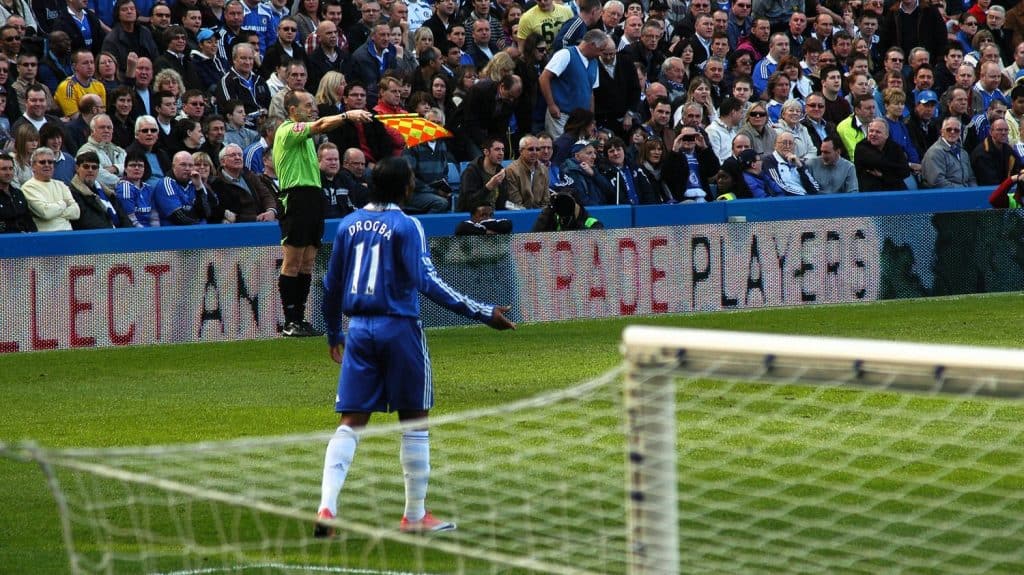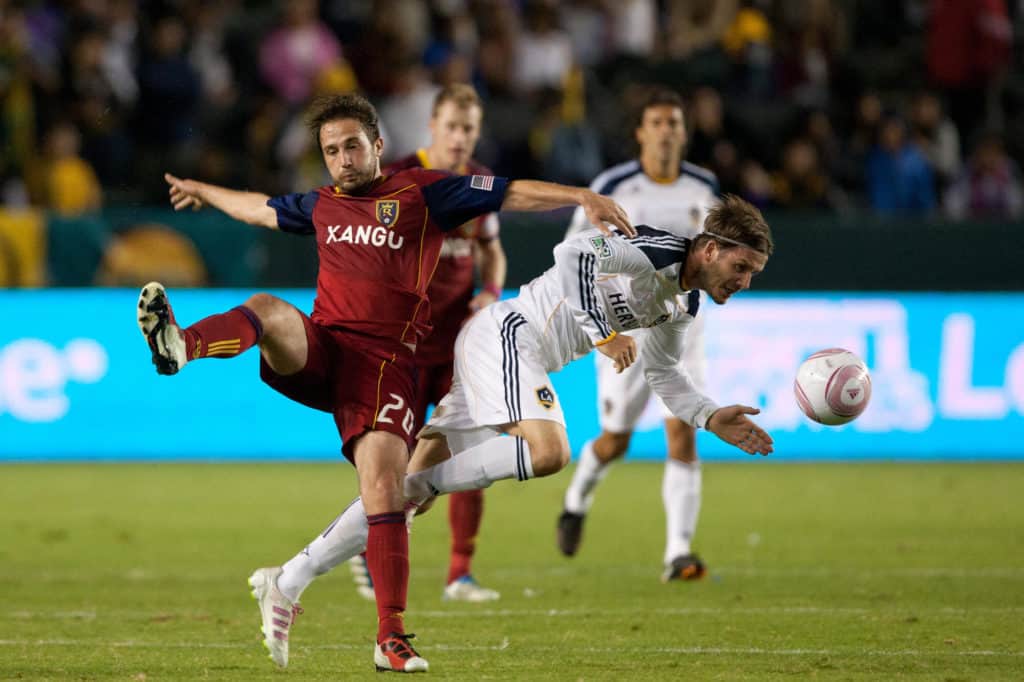Prior to starting my professional soccer career, I was not very familiar with the concept of relegation in soccer. It was something I heard here and there, but I wasn’t really sure how it worked.
Lo and behold, my first official professional contract was to a team at risk of relegation. They were looking to bring in players during the transfer window to help them win games and avoid relegation.
So, what exactly is relegation in soccer? Let’s take a closer look at this concept by addressing the following:
- How soccer relegation works
- The “Why” behind the relegation
- Ins and outs of Premier League relegation
Keep reading to find out more about soccer relegation!

- What is Relegation in Soccer?
- What is Promotion and Relegation in Soccer?
- Is Relegation Real?
- Why Do Soccer Teams Get Relegated?
- How Often Does Relegation Happen?
- What Happens When You Get Relegated?
- How Much Do Relegated Teams Get?
- How Does Relegation Work in the Premier League?
- Relegation Premier League 2021
- Why Is There No Relegation in US Sports?
- What Happens At The End Of The Season
What is Relegation in Soccer?
Relegation is when the lowest ranking teams in a soccer league get moved down to the lower league. At the end of each full season, the bottom-placed teams are relegated down to the division below their current league.
How many teams get relegated depends on the specific country. Each country/league has its own rules regarding relegation. For example, three teams are usually relegated in England, whereas Scotland only relegates one.
What is Promotion and Relegation in Soccer?
Promotion is the opposite of relegation. While the bottom few teams are relegated down, the top finishing teams from the division below get promoted up.
For example, consider Germany’s Bundesliga. At the end of the season, the bottom two teams will be relegated down to the Bundesliga 2. At the same top, the top two teams from Bundesliga 2 will be promoted up to Bundesliga 1.
Is Relegation Real?
American sports generally do not have the concept of relegation, which can make the whole idea seem quite intense. However, relegation is real and is something that many countries do.
Why Do Soccer Teams Get Relegated?
The concept of relegation can seem surprising, but there are many good reasons for this system. Why do teams get relegates?
Here are a few of the top benefits of this system:
Earning a Spot in the Top League
In 2019, there were a total of 28,451 registered soccer clubs in Spain. Each and every one of the 20 teams in Spain’s top league, Liga 1, earned their spot.
The system of relegation and promotion forces teams to earn their place in the top league. When a new club/team arises, they start in the lowest league. They must win their way to the top by earning promotions after each season.
Contrast this with how the leagues in the US work. Teams from the USL leagues do not get promoted for winning, and MLS teams do not get relegated for losing. This means that, in theory, there could be some teams in lower leagues that are stronger than teams in the top league.
Motivate Bottom Teams
Relegation also ignites competition. Teams will fight to the last second and do whatever they can to avoid relegation.
Without relegation/promotion, teams (and fans) near the bottom of the table can easily lose steam. If a team knows they cannot make the playoffs or win the league, it’s hard to stay motivated to compete.
The concept of relegation helps fuel competition, especially near the bottom of the standings. You are always playing for something, trying to stay in the league.
We’re in a relegation battle. Anyone who doesn’t see it like that isn’t seeing it correctly.
Alan Shearer, former Premier League Player
Greater Competition

Promotion and relegation promote better competition in general. Lower teams that struggle to compete in the league are moved down to a league that may be a better fit. At the same time, teams that are dominating in their league will move up for more of a challenge.
Overall, this kind of system helps to prevent chronically losing teams and blowouts. It aims to ensure each league has proper competition, and that teams get opportunities to find the right fit for them.
How Often Does Relegation Happen?
Relegation happens once a year, at the end of the full season. Most leagues have a mid-season break (which includes a transfer window). Relegation does not happen at this time, only at the end of the entire season.
What Happens When You Get Relegated?
When a team gets relegated, they must compete in the league immediately junior for the next season. So, relegation from the 1st league means you will play in the 2nd league, relegation from the 2nd league means you will play in the 3rd league, and so on.
Teams also tend to lose money from relegation. They may lose more lucrative sponsorships and TV deals.
Furthermore, teams may lose key players or managers. Players may look for teams who are in a higher league and offering higher pay.
In general, relegation can be pretty detrimental for some teams. They may lose significant money, lose top players, have to play more games, etc.
How Much Do Relegated Teams Get?
Overall, relegation costs the teams money. This is part of the reason why teams try so hard to avoid it.
However, the Premier League introduced parachute payments to help teams deal with relegation. This means that relegated clubs receive an equal percentage of the EPL broadcasting revenue. The first year’s payment is about 55% of what EPL clubs receive, which ends up being about £40m.
How Does Relegation Work in the Premier League?

As the most popular soccer league in the world, the English Premier League is one that many Americans are familiar with.
Let’s take a closer look at what relegation means in English soccer.
What is Relegation in the Premier League?
Relegation in the Premier League works just like it does in other leagues. For the EPL, the three lowest placed teams at the end of the season are relegated down to the next league, the Championship.
Promotion and Relegation Premier League
On the flipside of relegation in the Premier League is promotion. While the three lowest placed teams from the EPL move down to the Championship, teams are also promoted up from the Championship.
The two top-ranked teams from the Championship at the end of the season move up to the EPL. One other team from the Championship will earn promotion via a play-off series that involves the third-sixth ranked teams.
Who Gets Relegated in the Premier League?
No team is immune to EPL relegation, as it all depends on the results from the year. The bottom three teams are relegated from the EPL.
That being said, there are a few teams who have never been relegated from the highest league in England since its inception in 1992. The following clubs have never faced relegation:
- Manchester United
- Tottenham
- Arseanal
- Liverpool
- Everton
- Chelsea
Notably, Brighton has also avoided relegated since earning EPL promotion for the 2017/2018 season.
On the other hand, there are some teams that have consistently been relegated when reaching the EPL. Here’s a breakdown of the 4 most-relegated Premier League teams:
| Team Name | # of Relegations from EPL |
| Norwich City | 5 |
| West Bromwich Albion | 5 |
| Crystal Palace | 4 |
| Sunderland | 4 |
Relegation Premier League 2021
In the previous system, the 2020/2021 season, the three relegated teams included:
- Sheffield United
- West Bromwich
- Fulham
Who will face relegated in the Premier League for the 2021/2022 season? Since the season is only at its midway point at this time, relegation is still up in the air. The season started on August 13, 2021, and will conclude on May 22, 2022.
Teams still have many games left to battle their way out of relegation. That being said, the current standings show which teams are in the hot seat when it comes to relegation.
The three-team currently in the relegation zone for the Premier League are:
- Burnley
- Newcastle
- Norwich City
Furthermore, people are already making their predictions about EPL 2021/2022 relegations.
As is often the case, the three [most recently] promoted teams are the favorites to fall through the trapdoor.
WSN
However, 12 out of 20 clubs are not in the clear for relegation. Even though they are not currently in the red zone, they could statistically still fall into it.
Why Is There No Relegation in US Sports?

While promotion and relegation are widespread throughout the world, the United States does not use this system for sports, including soccer. Some lower leagues may implement this system, but ultimately the teams cannot be promoted to the highest tier.
So, why doesn’t the US use the same system as clubs around the world?
Here are some of the most common reasons cited:
Lack of Multiple Levels
In other countries, it’s common to find 3,4, or even more professional levels. Overwhelmingly, this is not the case in the U.S. For the majority of sports, there’s just one official professional league.
One primary example is the women’s professional league in the United States, the NWSL. There are other amateur/semi-professional leagues, but no other professional league.
Closed System
Even when there are other levels, they are not associated with or part of the highest level league.
Professional leagues in the U.S. operate as closed systems and a single-entity structure. Clubs are not independently owned. The owners purchase a stake in the league and obtain rights to a certain club. So, any team owners are partners in the league (which means it wouldn’t make sense for them to “split up” via relegation).
Logistics
Another key, and often overlooked, consideration is the vast size of the U.S. itself. Countries in Europe are much smaller in comparison, making it easier to implement relegation/promotion, and an overall fluctuating system where teams may have games in very different locations from year to year.

What Happens At The End Of The Season
Relegation in soccer is when the lowest-finishing teams at the end of the season move down to the level below. At the same time, the top finishers from the league below move up.
The relegation/promotion system is widespread around the globe, except for in the U.S. This system facilitates higher stakes for teams at the bottom, greater competition within leagues, and overall excitement for fans and players.
However, this system may never make its way over to the U.S., as the current closed, single entity system is highly lucrative for team owners and the league. Furthermore, there are more extreme logistical considerations due to the vast size of the country.
Even if U.S. soccer never features relegation, soccer fans can experience some of the thrills by tuning into other leagues around the world, like the well-known English Premier League!
Joel is a seasoned soccer journalist and analyst with many years of experience in the field. Joel specializes in game analysis, player profiles, transfer news, and has a keen eye for the tactical nuances of the game. He played at various levels in the game and coached teams - he is happy to share his insight with you.



